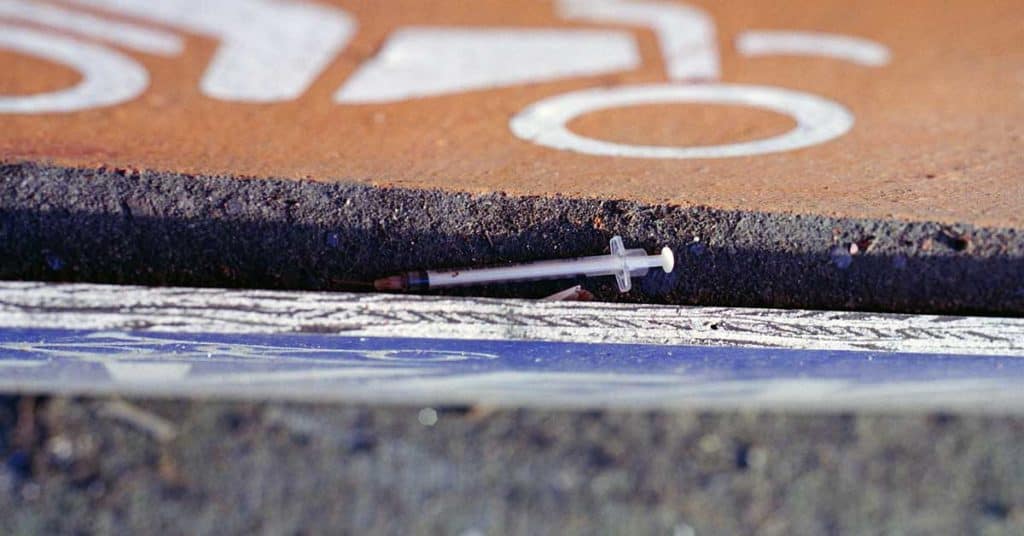Heroin Detox Pennsylvania

Heroin can be a dangerous drug to have an addiction to. Its high potency and addictiveness can lead to life-threatening health problems, which can occur through long-term and, even, short-term use. If you are struggling with a heroin addiction, or if you suspect that a loved one is dealing with an addiction to heroin, then don’t worry. Effective treatment is only a phone call away.
There are specific ways of detoxing from drugs. Detoxing from some drugs, such as heroin, should be carried out at a treatment center. Before starting treatment, it would be helpful to know a bit about what detoxing from heroin might involve. This article will tell you all you need to know about heroin detox, and where to get help for your addiction.
Heroin: An Overview
Heroin is an opioid drug that is naturally derived from the opium poppy plant. The drug, which is most commonly ingested through smoking or injection, binds with opioid receptors in the body. These receptors then release brain chemicals, known as neurotransmitters, that produce the effects for the user.
In the US, the Drug Enforcement Administration (DEA) considers heroin to be a Schedule I drug. This means that they consider the drug to have no currently accepted medical use as well as a high potential for drug abuse. This is a fair assessment of the drug considering statistics about drug deaths.
Heroin has, for a long time, been one of the most dangerous drugs in the world. According to a report by the National Institute on Drug Abuse (NIDA), in the US, opioids – the group of drugs that heroin belongs to – were responsible for 68,630 deaths in 2020. The Centers for Disease Control and Prevention (CDC) report that this figure makes up a whopping 82.3% of all drug deaths in the US. So, why is this figure so high?

Heroin Abuse
While heroin is not the most used drug, it accounts for a disproportionately high number of drug deaths. There are a few reasons for this.
First, the drug is highly potent. This means that someone taking the drug is risking their health by taking it. Overdoses on heroin are relatively common when compared to other drugs.
Secondly, it is highly addictive. Heroin is in a class of drugs that include many prescription painkillers, such as hydrocodone and oxycodone. Because these drugs are both physically and psychologically addictive, someone using prescription opioids may start looking for stronger and cheaper ways of getting high. This is exactly what heroin provides.
Read more about snorting and smoking heroin
Another reason why heroin is so dangerous is that it is tolerance-forming. This means that someone who uses the drug regularly will find that as their use continues, they need more of the drug to get the same effect. This can lead to overdoses when someone’s tolerance is not as high as they thought it was, possibly after abstaining from the drug for a while.
Finally, because heroin is an illicit substance, dealers may cut it with other drugs, unbeknown to the user. It is becoming more and more common to find heroin bought on the streets to contain fentanyl. Fentanyl is an opioid that is even stronger than heroin, and also more deadly. Individuals who use heroin, without knowing about other drugs that it may contain, run the risk of overdosing. This is because there is no way for them to know how much of the drug their body can handle.

Heroin Addiction
Many people struggling with a heroin addiction may not actually recognize that they are addicted to the drug. That could be whether they are functional and able to carry out their daily responsibilities, or it could be that their addiction has slowly taken over their life, leaving them powerless to it.
Addiction – either a psychological addiction to cannabis or physical addiction to heroin – has some regular signs. You may be able to observe that you, or a loved one, is struggling with an addiction if:
- The drug becomes a main priority in their life.
- They regularly miss events with family and friends because of their drug use.
- They encounter financial issues owing to their drug use.
- They appear to have a new social circle.
- They struggle to maintain satisfactory performance at work, or could lose their job.
- Their personal hygiene and appearance become worse.
Another signifier of addiction is if an individual experiences withdrawal symptoms when stopping their use of the drug. Withdrawal symptoms are symptoms that you may experience after a dependence on a drug has developed. Some often conflate dependence with addiction; however, someone who is experiencing a dependence to a drug is not necessarily addicted to it. These withdrawal symptoms may occur when detoxing from a drug.
If you are able to observe these behaviors in yourself, or someone you know, then it could signify that you or they are struggling with a drug addiction. If this is the case, then it is important to reach out and get help. Drug addictions are not perceived negatively as they once were. Professionals now understand it to be a medical condition that needs treatment.

What Is Heroin Detox?
Heroin detoxification is what an individual with an addiction or dependence may go through to wean them off of the drug. In general, doctors may carry out the detox process in one of two ways. This can be through medical detox or quitting cold turkey.
A cold turkey detox involves quitting a drug without any medication, but quitting cold turkey is not recommended and is dangerous. For some drugs, it is possible to do this at home. Quitting some other drugs cold turkey needs medical supervision. For some drugs, such as heroin, medical detox is always recommended.
Medical detox is when a medical professional incorporates medications to help you deal with the negative effects of withdrawal symptoms, such as drug cravings. If a drug is dangerous to quit cold turkey (such as heroin), medical detox can make withdrawal safer. In terms of heroin addiction, a heroin detox program involving medication will generally involve addiction medicine. This medicine eases symptoms that could be so unpleasant to an individual that they may relapse.
Medical detox is always recommended to quit heroin. The withdrawal symptoms involved can make detoxing cold turkey either ineffective due to relapse, or dangerous due to self-harm or suicidal ideation caused by the withdrawal process.

Heroin Withdrawal
As mentioned, withdrawal is something that occurs when someone who is dependent on a drug experiences negative symptoms when they quit the drug. Heroin withdrawal symptoms can be very uncomfortable and sometimes even dangerous. Specific symptoms of heroin withdrawal start anywhere between six to twelve hours after the last dose.
Withdrawal is different for everyone, so what one person might experience when they quit heroin may be completely different from what someone else experiences. Some individuals may not experience withdrawal symptoms at all. It is, however, important to know what the withdrawal process may entail.

Symptoms of Heroin Withdrawal
Typically, the rapid onset of heroin withdrawal symptoms starts within six to twelve hours after the last dose. The most severe withdrawal symptoms occur around day two or three and most often last for around five to ten days after the last dose.
Common withdrawal symptoms that could be experienced include both physical symptoms and emotional withdrawal symptoms.
Physical symptoms of heroin withdrawal
- Nausea and vomiting
- Stomach and abdominal cramps
- Diarrhea
- Increased blood pressure and heart rate
- Impaired respiration
- Muscle aches and spasms
- Tremors
- Runny nose
- Cold sweats
- Yawning and fatigue
Emotional and Psychological Symptoms
- Agitation and restlessness
- Problems with concentration
- Increased anxiety and depression
- Suicidal ideation
- Insomnia
- Intense cravings
Heroin Withdrawal
Sometimes an individual going through the heroin withdrawal process may experience withdrawal symptoms that last for longer than the typical ten-day period. Known as post-acute withdrawal symptoms, these symptoms may last for months or longer after taking the last dose. This is most likely to occur in individuals who have been using large doses of heroin for a long period of time. It is important to remember, if you are experiencing post-acute withdrawal symptoms, that your symptoms will subside eventually, no matter how long it takes.
While these heroin withdrawal symptoms in themselves are not directly life-threatening, when someone is experiencing such intense symptoms, they may be driven to engage in behavior that risks their health. Therefore, when going through a heroin detox, we recommend that you go through medical detox, under supervision, at a detox center.
Related: How long does heroin stay in your system

Heroin Addiction Treatment
After reading this, heroin withdrawal might sound like it will be too much for you. You may worry that your addiction has been going on for too long, or you may be thinking that addiction has too tight a grip on you to ever let go. Both of these situations do not have to be the case.
Addiction treatment is widely available and can be effective if you are ready to take the step. By treating any co-occurring mental health disorders, professionals are able to help you address behavioral health conditions that could be reinforcing your cycle of substance abuse. The treatment process will involve not only a detox program but also a support system for you to have a successful recovery process.
Stopping heroin addiction involves medication and behavioral health care, carried out by licensed medical professionals who know that addiction is a disease. In addiction treatment programs, you will have the ongoing support of caring and compassionate staff to help you tackle your substance use disorder.

Where Can I Find Treatment?
Addiction treatment is more effective now than it ever has been. Medical professionals know to treat addiction with the compassion and care that you deserve. Whether you are looking for a heroin detox program to ease heroin withdrawal or alcohol rehab, effective treatment programs are available.
Here at Brookdale, we provide highly skilled medical and clinical support for individuals struggling with drug and alcohol addictions. Our luxury resort means that you will be able to recover in a serene setting, far away from your life of addiction.
Call us at (570) 701-8133 or email us: [email protected] and discover the world-class facilities we can offer at our treatment center, while you take the time you need to find long–lasting recovery.
Together, with Brookdale, you can leave your life of substance abuse behind.

